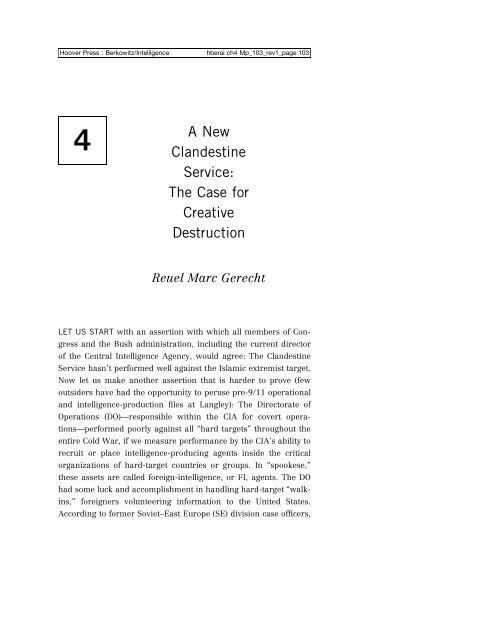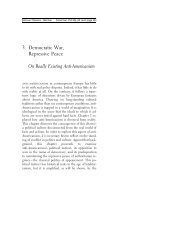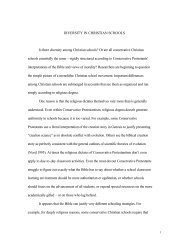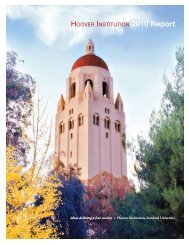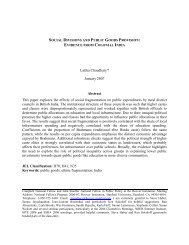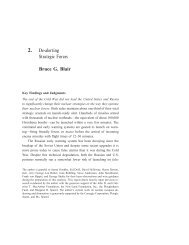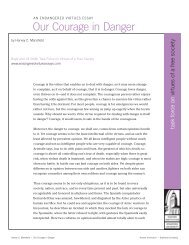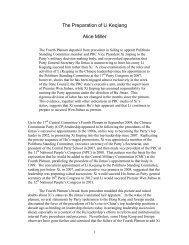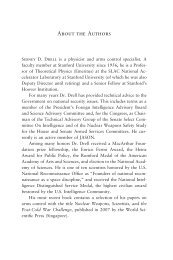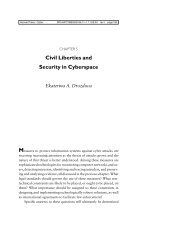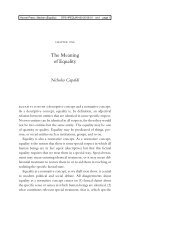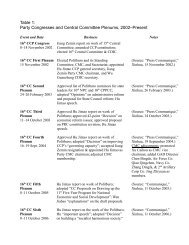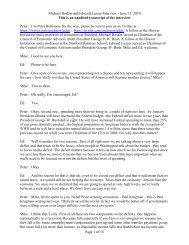A New Clandestine Service: The Case for ... - Hoover Institution
A New Clandestine Service: The Case for ... - Hoover Institution
A New Clandestine Service: The Case for ... - Hoover Institution
Create successful ePaper yourself
Turn your PDF publications into a flip-book with our unique Google optimized e-Paper software.
<strong>Hoover</strong> Press : Berkowitz/Intelligence hberai ch4 Mp_103_rev1_page 103<br />
4<br />
A <strong>New</strong><br />
<strong>Clandestine</strong><br />
<strong>Service</strong>:<br />
<strong>The</strong> <strong>Case</strong> <strong>for</strong><br />
Creative<br />
Destruction<br />
Reuel Marc Gerecht<br />
LET US START with an assertion with which all members of Congress<br />
and the Bush administration, including the current director<br />
of the Central Intelligence Agency, would agree: <strong>The</strong> <strong>Clandestine</strong><br />
<strong>Service</strong> hasn’t per<strong>for</strong>med well against the Islamic extremist target.<br />
Now let us make another assertion that is harder to prove (few<br />
outsiders have had the opportunity to peruse pre-9/11 operational<br />
and intelligence-production files at Langley): <strong>The</strong> Directorate of<br />
Operations (DO)—responsible within the CIA <strong>for</strong> covert operations—per<strong>for</strong>med<br />
poorly against all “hard targets” throughout the<br />
entire Cold War, if we measure per<strong>for</strong>mance by the CIA’s ability to<br />
recruit or place intelligence-producing agents inside the critical<br />
organizations of hard-target countries or groups. In “spookese,”<br />
these assets are called <strong>for</strong>eign-intelligence, or FI, agents. <strong>The</strong> DO<br />
had some luck and accomplishment in handling hard-target “walkins,”<br />
<strong>for</strong>eigners volunteering in<strong>for</strong>mation to the United States.<br />
According to <strong>for</strong>mer Soviet–East Europe (SE) division case officers,
<strong>Hoover</strong> Press : Berkowitz/Intelligence hberai ch4 Mp_104_rev1_page 104<br />
104 Reuel Marc Gerecht<br />
all of the important Soviet assets we had during the Cold War were<br />
walk-ins. <strong>The</strong>y came to us. We didn’t recruit them, though occasionally<br />
CIA case officers turned would-be defectors into agents<br />
willing to commit espionage inside their homelands. <strong>The</strong> CIA didn’t,<br />
of course, admit this datum to the <strong>Clandestine</strong> <strong>Service</strong>’s junior-officer<br />
classes—or to anyone else—during the Cold War. It preferred<br />
to maintain the fiction that SE case officers, and operatives from<br />
other geographical divisions who prowled the diplomatic cocktail<br />
circuit, could find and recruit KGB or other Soviet officials willing<br />
to provide critical intelligence. But a <strong>for</strong>mer chief of the Soviet–East<br />
Europe division, Burton Gerber, once confessed that the few Soviets<br />
ever actually recruited—and Africa, where race-conscious Russians<br />
could feel very lonely, was probably the best hunting ground—had<br />
never been valuable.<br />
To my knowledge—and I have spoken to numerous case officers<br />
from all of the operations directorate’s geographic divisions and<br />
from the Counterterrorism Center—the recruitment myth/walk-in<br />
reality usually repeated itself against most hard targets the agency<br />
faced in the first fifty years after its founding in 1947. This operational<br />
hard fact leaves aside the question of whether the walk-ins<br />
and recruitments significantly improved our knowledge of the most<br />
lethal aspects of our enemies. In the case of the Soviet Union, the<br />
answer would have to be yes, certain key agents did provide highly<br />
valuable in<strong>for</strong>mation, though it is certainly debatable whether any<br />
asset—even the most prized scientific sources reporting on Soviet<br />
avionics—changed the way the West arrayed itself during the Cold<br />
War. <strong>The</strong>se assets never snatched victory from the jaws of defeat,<br />
but they probably gave air <strong>for</strong>ce planners more confidence in the<br />
superiority of their weapons and tactics over those of the Warsaw<br />
Pact. With respect to Iraq, Cuba, East Germany, North Vietnam,<br />
and North Korea, however, the answer appears to be a resounding<br />
no. In the case of the Islamic Republic of Iran in the first few years<br />
after the Islamic revolution, the CIA probably gets a “C,” since <strong>for</strong>-
<strong>Hoover</strong> Press : Berkowitz/Intelligence hberai ch4 Mp_105_rev1_page 105<br />
A <strong>New</strong> <strong>Clandestine</strong> <strong>Service</strong><br />
105<br />
mer officials and officers of the old regime, who were kept on in<br />
the new, occasionally provided illuminating in<strong>for</strong>mation about the<br />
post-revolution Iranian military, particularly in its fight against Saddam<br />
Hussein. After 1989, with the end of the Iraq-Iran war, the<br />
death a year earlier of Ayatollah Ruholla Khomeini, and the great<br />
Iranian “takedown,” in which Tehran demolished the CIA’s network<br />
inside the country, the scorecard on the operations directorate’s<br />
per<strong>for</strong>mance probably wouldn’t be passing. 1 Work against<br />
America’s likely next superpower adversary, Communist-now-Fascist<br />
China, would also probably get a failing grade. <strong>Case</strong> officers to<br />
whom I’ve spoken differ on this point, though none thinks the CIA’s<br />
operational work against Beijing should get high marks. At least<br />
one, an attentive Chinese-speaking ops officer who served in Beijing<br />
in the 1990s, believes Langley’s Chinese operations are thoroughly<br />
penetrated by Chinese counterintelligence. In other words, what the<br />
Soviet Union did to us in the 1980s, the People’s Republic is doing<br />
now.<br />
It is not my intention here to work through the CIA’s operational<br />
history, focusing on the quality and impact of <strong>for</strong>eign intelligence<br />
provided by agency assets. That task would be enormously<br />
valuable <strong>for</strong> the institution—honest operational reflection is not a<br />
strong suit of the CIA and the small cadre of in-house, highly<br />
restricted CIA historians. <strong>The</strong> task would be even more important<br />
<strong>for</strong> outsiders, particularly <strong>for</strong> officials and staffers in the executive<br />
and legislative branches who are charged with overseeing and paying<br />
<strong>for</strong> Langley’s work. <strong>The</strong> CIA’s <strong>New</strong> Testament motto, “And ye<br />
shall know the truth, and the truth shall make you free,” is obvi-<br />
1. For the best press commentary on the Iranian “takedown” and <strong>for</strong> the<br />
most insightful journalism on the travails of the post–Cold War <strong>Clandestine</strong> <strong>Service</strong>,<br />
see John Walcott and Patrick Duffy, “<strong>The</strong> CIA’s Darkest Secrets,” U.S. <strong>New</strong>s<br />
and World Report, July 4, 1994. Although not without its inaccuracies, Walcott’s<br />
and Duffy’s reporting is easily the finest piece of mainstream journalism ever on<br />
the systemic problems of agency espionage operations.
<strong>Hoover</strong> Press : Berkowitz/Intelligence hberai ch4 Mp_106_rev1_page 106<br />
106 Reuel Marc Gerecht<br />
ously essential <strong>for</strong> a functioning democracy, particularly <strong>for</strong> its<br />
secretive organizations that do not regularly benefit from the intrusive<br />
light of curious (well-meaning) outsiders. It is consistently<br />
astonishing to see how short the memories are of our elected representatives<br />
and their professional staffers. <strong>The</strong> CIA, whose case<br />
officers rarely read large active operational files, let alone defunct<br />
ones stored in the archives, nevertheless usually runs rings around<br />
White House or congressional officials who attempt, ever so gently,<br />
to query the agency about operational per<strong>for</strong>mance. Even senior<br />
staff at the White House don’t want to know much about CIA<br />
sources and methods, <strong>for</strong> fear they could be blamed <strong>for</strong> revealing<br />
the identity of an agent or the existence of a sensitive operation.<br />
Truth be told, most members of Congress’s intelligence oversight<br />
committees really don’t like doing oversight.<br />
Critical oversight is, by definition, adversarial, and most congressional<br />
members, Republican and Democrat alike, would much<br />
rather be collegial with each other and with the intelligence community—the<br />
natural patriotic reflex works in favor of the status quo.<br />
<strong>The</strong> hidden and massive world of classification also protects the<br />
agency against a vigorous congressional inclination to assess the<br />
bang-versus-buck value of America’s clandestine human intelligence<br />
collection ef<strong>for</strong>ts. Furthermore, the paltry sums involved in<br />
funding the <strong>Clandestine</strong> <strong>Service</strong> have unquestionably encouraged a<br />
lackadaisical, trusting approach. But this is not to say that the <strong>Clandestine</strong><br />
<strong>Service</strong> is underfunded. Some have argued that the DO’s<br />
human intelligence collection—also known as HUMINT—is deficient<br />
in part because the United States spends too much money on technical<br />
intelligence. Those critics are, to put it politely, misin<strong>for</strong>med.<br />
When exuberantly funded—as HUMINT was in the 1950s, 1960s,<br />
1980s, and post-9/11—the <strong>Clandestine</strong> <strong>Service</strong> is inexpensive to<br />
maintain. Yet the quality of HUMINT against hard targets that did<br />
not derive from walk-ins was mediocre to awful in the past and,<br />
according to active-duty officers, awful to nonexistent today. I have
<strong>Hoover</strong> Press : Berkowitz/Intelligence hberai ch4 Mp_107_rev1_page 107<br />
A <strong>New</strong> <strong>Clandestine</strong> <strong>Service</strong><br />
107<br />
never met a case officer who has said, “I couldn’t do this important<br />
operation because I didn’t have the money.” Not once. A few billion<br />
dollars goes a very long way in covert affairs. <strong>The</strong> agency, like any<br />
other bureaucracy, will always plead <strong>for</strong> more cash, even when<br />
operatives in the field have more money than they know what to<br />
do with. 2<br />
<strong>The</strong> Republican dig at Democratic presidential candidate Senator<br />
John Kerry, who pre-9/11 often voted against more money <strong>for</strong><br />
the CIA, may have been politically astute, but on its face, it made<br />
no sense (to be sure the senator has never given any hint that he’s<br />
grasped the real, nonpoliticized troubles of Langley). Would that<br />
more Republicans understood that more money <strong>for</strong> the CIA is more<br />
often than not the equivalent of giving crack to a heroin addict. In<br />
fact, the CIA has always feared the critiques coming from the American<br />
Right more than those from the American Left because the<br />
Right has usually focused on Langley’s competence, not its operational<br />
ethics. A malevolent or “rogue” CIA has to be, by definition,<br />
a somewhat competent organization. In my experience, Republican<br />
staff members of the two intelligence oversight committees are<br />
more likely to approach the agency with greater skepticism and<br />
probing queries. Be<strong>for</strong>e 9/11, the only staff director of the Senate<br />
2. Former CIA director George Tenet, politically the most astute director<br />
since Richard Helms, has probably been the most accomplished practitioner of<br />
the “If I’d only had more money” CIA school of congressional operations. When<br />
Tenet kept doing this line in 2004, after substantial post-9/11 increases in the<br />
agency budget, even the traditionally friendly ground of the Senate Select Committee<br />
on Intelligence, where Tenet once worked as the staff director, turned<br />
hostile and more openly dismissive of his promises. It is, however, an excellent<br />
bet that the Senate and House intelligence oversight committees will continue to<br />
give the CIA, particularly the DO, more money even though senior members of<br />
those committees may question the bang-versus-buck results. No one on the Hill<br />
wants to be accused of shortchanging American intelligence in the war on terror.<br />
During the Cold War, Democratic Senator Patrick Moynihan often trenchantly<br />
(sometimes unfairly) critiqued the CIA’s intelligence collection and analysis. Yet<br />
Moynihan always ended up giving the CIA the monies it asked <strong>for</strong>.
<strong>Hoover</strong> Press : Berkowitz/Intelligence hberai ch4 Mp_108_rev1_page 108<br />
108 Reuel Marc Gerecht<br />
Select Committee on Intelligence who ever tried to use the committee<br />
to push aggressively <strong>for</strong> a re<strong>for</strong>m agenda inside the CIA and the<br />
broader intelligence community was a Republican. Taylor<br />
Lawrence, a poor Southern boy with a Ph.D. from CalTech, had the<br />
self-confidence to challenge accepted practices in the late 1990s,<br />
when it was crystal clear to him and several other professional staff<br />
members that the <strong>Clandestine</strong> <strong>Service</strong>, among other American intelligence<br />
institutions, was in trouble. Too controversial <strong>for</strong> the intelligence<br />
bureaucracies and the always-collegial but stubbornly<br />
political Senate oversight committee, he failed and resigned—and<br />
the re<strong>for</strong>m agenda went with him.<br />
<strong>The</strong> constant refrain one regularly hears on the American Right<br />
that Bill Clinton destroyed, or greatly accelerated the decline of, the<br />
CIA is another unfounded critique. <strong>The</strong> <strong>Clandestine</strong> <strong>Service</strong> was a<br />
mediocre organization long be<strong>for</strong>e Clinton’s election. Indeed, President<br />
Clinton’s first director, James Woolsey, attempted to <strong>for</strong>ce the<br />
DO to develop standards to review the quality of agency assets—<br />
the first time any director had done so. Senior management and<br />
the rank and file of DO, however, quickly diluted in practice Woolsey’s<br />
guidelines so that the old habits of recruitment and intelligence<br />
exaggeration and fraud continued. 3<br />
3. Woolsey made a similar bold attempt to <strong>for</strong>ce the declassification of<br />
defunct covert-action programs. Here, too, the bureaucracy didn’t zealously comply.<br />
<strong>The</strong> 1953 CIA/MI6-sponsored coup d’état against Iranian prime minister<br />
Mohammad Mossadeq is an excellent case in point. A brief agency in-house history<br />
of this affair should have been quickly released. Langley had in its possession<br />
no other official recollection of the event. Nonetheless, the history remained classified.<br />
When this compilation ended up in the hands of the <strong>New</strong> York Times in<br />
2000, the CIA Publications Review Board, according to an official in the review<br />
office, was furious. It had no right to be furious. <strong>The</strong> declassification folks at<br />
Langley were either negligent or in willful disregard of Woolsey’s directive—or<br />
both. After the Times’ publication, Woolsey remarked to me that his directive was<br />
intended specifically <strong>for</strong> this kind of historically rich documentation. One would<br />
be hard-pressed to find a more historically resonant covert action. It is possible<br />
the politically incorrect nature of this project may have had something to do with<br />
the institution’s disinterest in declassifying it. Given the secrecy temperament,<br />
the bureaucratic depth, and the ahistorical ambiance of Langley, it would be
<strong>Hoover</strong> Press : Berkowitz/Intelligence hberai ch4 Mp_109_rev1_page 109<br />
A <strong>New</strong> <strong>Clandestine</strong> <strong>Service</strong><br />
109<br />
<strong>The</strong> standard critiques miss the mark. <strong>The</strong>re simply is no such<br />
thing as a case officer who didn’t try to recruit a Middle Eastern<br />
terrorist because of concerns about the possible legal blow back<br />
from associating with someone who may have engaged in criminal<br />
behavior. In addtion, the press, retired case officers wanting to<br />
underscore their own hard-nosed credentials (and a history depicting<br />
the CIA as a more manly, competent place when they were<br />
“hitting the streets” as operatives), and a wide variety of folks on<br />
the right often can’t resist putting the blame <strong>for</strong> the agency’s many<br />
recent failures on an American overemphasis of technical intelligence<br />
at the expense of HUMINT, on politically correct humanrights<br />
sensitivities that mushroomed under Clinton, or on<br />
insufficient funding during the 1990s. In fact, these critiques are in<br />
no way justified by the intelligence reports, operational files, and<br />
firsthand experiences of the young case officers (those who did<br />
fewer than four tours) in the Reagan, Bush père, and Clinton years. 4<br />
unwise, however, to suggest too strongly that the CIA was resisting declassifying<br />
something that, in today’s light, might seem embarrassing. More likely, CIA officials,<br />
not wanting to offend their British colleagues, who operate under the draconian<br />
British Official Secrets Act, ignored Woolsey’s order. According to a<br />
historian in the CIA, the Review Board gave greater weight to British concerns<br />
than to the statutory authority of a CIA director to determine classification and<br />
public access. One thing is certain: Since its publication, there hasn’t been the<br />
slightest hint of blow back against any Iranian or his descendent mentioned in<br />
the official history—the oft-used reason <strong>for</strong> why the clandestine service refuses<br />
to release its past even when CIA directors order it do so.<br />
4. Senior DO officers at headquarters and in the field could, however, be<br />
fearful in their approaches toward dangerous targets. According to several case<br />
officers, countersurveillance teams deployed to protect operatives in meetings<br />
with possibly dangerous <strong>for</strong>eign agents and “developmentals” became more common<br />
in these years. Aggressive counterterrorist officers in the 1980s and 1990s<br />
could regularly encounter stiff resistance from headquarters or station management<br />
if suggested operational actions were too muscular (must never physically<br />
intimidate the other side) or likely to put an officer into harm’s way. I can’t recall<br />
of a single instance where a case officer died because he put himself into harm’s<br />
way in a clandestine relationship with any terrorist organization. According to<br />
several CIA officers, no case officer has died since 9/11 in a clandestine operation<br />
against the Islamic terrorist target.
<strong>Hoover</strong> Press : Berkowitz/Intelligence hberai ch4 Mp_110_rev1_page 110<br />
110 Reuel Marc Gerecht<br />
<strong>The</strong> principle problem during Clinton’s presidency, as be<strong>for</strong>e<br />
and after, was the inability of case officers to meet Islamic terrorists,<br />
those who associate with Islamic terrorists, or even those who<br />
might remotely know those who associate with Islamic terrorists.<br />
In the Clinton era, under directors Woolsey, John Deutch, and<br />
George Tenet, case officers would have loved to be morally and<br />
legally challenged by the possible recruitment of a terrorist who<br />
might have had something to do with the death of an American<br />
citizen. Neither they nor in all probability the directors above them<br />
would have hesitated to move on such cases if there had been such<br />
cases. Clinton may not have cared all that much about the intelligence<br />
business—though he certainly gave the impression of having<br />
a rapidly growing interest after the embassy bombings in Africa in<br />
1998. But Clinton’s weaknesses in <strong>for</strong>eign affairs mattered not at<br />
all to counterterrorist case officers “on the street.”<br />
Read the press commentary on the CIAs of William <strong>Case</strong>y,<br />
James Woolsey, John Deutch, and George Tenet, and the well-being<br />
and ethos of these institutions look remarkably like what the press<br />
sees as the character of the director. <strong>The</strong>re is a powerful hierarchical<br />
disposition in Washington, in both the government and the<br />
press, to judge a bureaucracy first and <strong>for</strong>emost by the men and<br />
women who lead it. This approach can have merit, particularly<br />
when dissecting institutions where there is an organic relationship<br />
between the leaders and the led—<strong>for</strong> example, in the military. In<br />
dealing with the CIA’s <strong>Clandestine</strong> <strong>Service</strong>, however, it makes<br />
almost no sense. I had considerable admiration <strong>for</strong> William <strong>Case</strong>y,<br />
the determined, covert action–loving cold warrior. But when he was<br />
the director of central intelligence, <strong>Case</strong>y was irrelevant to the <strong>Clandestine</strong><br />
<strong>Service</strong>’s espionage ethics and the vast majority of espionage<br />
operations. Even with covert action where CIA paramilitary<br />
officers were not directing recoilless cannon-loaded needle-boats in<br />
the bays of Nicaragua, the influence of <strong>Case</strong>y was often very hard<br />
to detect. <strong>The</strong> bureaucracy dominated. In seven years of Iranian
<strong>Hoover</strong> Press : Berkowitz/Intelligence hberai ch4 Mp_111_rev1_page 111<br />
A <strong>New</strong> <strong>Clandestine</strong> <strong>Service</strong><br />
111<br />
operations, at a time in the 1980s and 1990s when Iranian operations<br />
often had the limelight inside the service, I’m hard-pressed<br />
to recall a single espionage operation that was shaped by a CIA<br />
director.<br />
Serious historical reviews of clandestine intelligence collection<br />
against the Soviets, Chinese, Iraqis, Iranians, Egyptians, Cubans,<br />
French, or Congolese might make insiders and outsiders wiser<br />
about the nature of the CIA and keep White House and congressional<br />
officials from heaping praise on past or present agency work<br />
that does not merit it. As a <strong>for</strong>mer case officer, I can say that such<br />
praise was very dispiriting to officers—particularly during the<br />
1980s and early 1990s, when egregious operational failures<br />
occurred regularly. What such officers wanted was outsiders to<br />
reprove the organization <strong>for</strong> its incompetence. That way our elected<br />
representatives might be less inclined to throw even more money<br />
at Langley each time it cocks up. Even if congresspeople or deputy<br />
national security advisers did not read these reviews—and these<br />
folks don’t have much reading time—the critiques would still bubble<br />
through the bureaucracy and the press, engendering more healthy<br />
skepticism and humility.<br />
But my objective here is different. I bring up the deficiencies of<br />
the past only to underscore the most urgent problems that now face<br />
us in constructing a CIA that has as its primary target Islamic<br />
extremist groups. Langley properly has a larger role than this—and<br />
I will discuss that role below—but a CIA that tries to reconstruct<br />
itself to battle al Qaeda and other Islamic militant organizations will<br />
surely become a better intelligence service against the Chinese,<br />
North Koreans, or Russians. As is the case with infectious disease<br />
doctors fighting AIDS, agency operatives building a <strong>Clandestine</strong> <strong>Service</strong><br />
capable of penetrating Islamic radical groups are learning skills<br />
and operational truths applicable to any hard target. And if the<br />
<strong>Clandestine</strong> <strong>Service</strong> cannot wage intelligent ef<strong>for</strong>ts against hard tar-
<strong>Hoover</strong> Press : Berkowitz/Intelligence hberai ch4 Mp_112_rev1_page 112<br />
112 Reuel Marc Gerecht<br />
gets—something it has not often done in the past—then it really<br />
doesn’t have a particularly compelling reason to exist.<br />
What does the CIA have deployed against al Qaeda and other<br />
Islamic extremist groups overseas? According to active-duty CIA<br />
officers, the methodology of agency deployment today is essentially<br />
unchanged since September 10, 2001. Traditional stations and<br />
bases lightly camouflaged inside official U.S. facilities are responsible<br />
<strong>for</strong> most of the “street” work—that is, case officers posing as<br />
fake diplomats are the overwhelming bulk of the organization’s<br />
frontline <strong>for</strong>ce. Needless to say, this “cover” is nearly useless in<br />
working the Islamic militant target. Diplomats and case officers are<br />
monitored in many Arab countries, and in serious countries with<br />
active Islamic militant organizations and competent internal security<br />
services—<strong>for</strong> example, Egypt or Jordan—any attempt to associate<br />
with Muslim activists would be noted almost immediately and<br />
viewed hostilely by the host government. <strong>The</strong> same would be true<br />
in much of western Europe, the launching plat<strong>for</strong>m of 9/11 and<br />
probably still the home of potentially the most operationally effective<br />
hard-core jihadists. This issue has greatly retarded the State<br />
Department from making contact with Islamic activists. Ditto <strong>for</strong><br />
undeclared American case officers, who most likely are “blown”—<br />
known—to the host government in serious counterintelligence<br />
countries like Egypt, Jordan, or France. It is extremely difficult <strong>for</strong><br />
agency officers, even with real, substantive, full-time State work to<br />
long maintain their cover against local employees—State calls them<br />
“<strong>for</strong>eign service nationals”—who dominate the administration in all<br />
embassies and consulates in the Middle East and Europe.<br />
An agency officer under diplomatic or consular cover trying to<br />
associate with Islamic militants could also easily anger his official<br />
State “cover boss,” who could get scolded by the Foreign Ministry<br />
<strong>for</strong> allowing one of his officers to go where he ought not. It isn’t<br />
unlikely that the protest could come through the “host” security service.<br />
In either case, CIA chiefs of station are usually loath to anger
<strong>Hoover</strong> Press : Berkowitz/Intelligence hberai ch4 Mp_113_rev1_page 113<br />
A <strong>New</strong> <strong>Clandestine</strong> <strong>Service</strong><br />
113<br />
senior American diplomats or the local security service, which can<br />
demand that station chiefs depart their posts. Senior CIA personnel<br />
abroad are inevitably married with kids, and they truly fear being<br />
declared persona non grata—to be “PNGed” is a dreaded verb at<br />
Langley. Quality of life is good <strong>for</strong> senior CIA officers, even in rather<br />
miserable Third World posts. <strong>The</strong> only way CIA officials can really<br />
save money given their low official salaries is to live abroad, where<br />
their rent, utility costs, and other day-to-day expenses are covered<br />
by Uncle Sam. Chiefs of station, who rule all U.S. operations within<br />
their countries, usually take a dim view of case officer activity that<br />
has a high probability of getting the station into trouble with the<br />
“host” service.<br />
In the future, this problem of militant association may, just possibly,<br />
change, depending on how <strong>for</strong>cefully the Bush administration<br />
pushes its democracy-advocacy programs in the Middle East. If<br />
Washington were to go to the mat, demanding access to Islamic<br />
activists <strong>for</strong> U.S. diplomats, it might be conceivable that agency officers<br />
could occasionally get the opportunity to say “hi” to Islamic<br />
militants, though they would likely be constantly or periodically surveilled<br />
while doing so. Needless to say, this kind of access isn’t<br />
particularly helpful, even if the officers concerned have good knowledge<br />
of Arabic and the right higher education to converse productively<br />
with Islamic activists (and according to CIA officers working<br />
on the Middle East, the number of operatives currently serving who<br />
have such qualifications is few). Islamic activists come in many different<br />
stripes, and it would take considerable time <strong>for</strong> a talented<br />
case officer with unrestricted, unmonitored access to get some idea<br />
of the concentric social and intellectual circles connecting moderate<br />
Islamists with the harder core ones who might have valuable in<strong>for</strong>mation<br />
about militants who are or could become operationally<br />
active anti-American jihadists in the Middle East, Europe, or the<br />
United States.<br />
It is possible to dream up scenarios where “inside” State
<strong>Hoover</strong> Press : Berkowitz/Intelligence hberai ch4 Mp_114_rev1_page 114<br />
114 Reuel Marc Gerecht<br />
Department–covered case officers could gain useful access to militant<br />
anti-American Islamist organizations: A case officer with consular<br />
cover meets a young Muslim male applying <strong>for</strong> a visa to study<br />
in the States and uses the consular leverage <strong>for</strong> repeated meetings.<br />
<strong>The</strong> young man volunteers in<strong>for</strong>mation suggesting knowledge of<br />
radical Muslim circles, and the case officer recruits him with money<br />
and the undefined (and easily <strong>for</strong>gotten) promise of aiding him later<br />
to get to the United States. <strong>The</strong> young man then proves a valuable<br />
access agent cum would-be radical Muslim, developing good in<strong>for</strong>mation<br />
on local al Qaeda membership, recruitment methods, and<br />
liaison relationships between radical Muslim groups and the host<br />
country’s security service. This scenario is certainly possible, which<br />
is why consular-covered CIA case officers are essential tools in<br />
operations targeting Third World radical organizations. (Radical<br />
Muslims with European passports, however, do not need to apply<br />
<strong>for</strong> visas at U.S. consulates, as they may travel to the U.S. on the<br />
visa-waiver program.)<br />
America’s counterterrorist program cannot be built, however,<br />
on the random luck of CIA officers in U.S. consulates. <strong>The</strong> chances<br />
of the above scenario happening are small, though sufficient<br />
enough to ensure that all consulates in the Middle East and in other<br />
countries with large Muslim, especially Arab, populations have CIA<br />
officers inside the consular cadre—not just waiting in the wings and<br />
depending on State Department personnel to do the initial spotting<br />
and assessing of possible targets. (Consular officers are among the<br />
most overworked members of the Foreign <strong>Service</strong>, and they absolutely<br />
don’t need to be tasked with security concerns that aren’t<br />
properly their own.) European and African countries with substantial<br />
Arab communities—whose members may lawfully carry several<br />
passports—must have well-integrated CIA officers working and<br />
reviewing the nonimmigrant and immigrant visa lines—something<br />
that, according to active-duty case officers, is rare overseas today,<br />
despite the consular/security discussions provoked by 9/11. <strong>The</strong>
<strong>Hoover</strong> Press : Berkowitz/Intelligence hberai ch4 Mp_115_rev1_page 115<br />
A <strong>New</strong> <strong>Clandestine</strong> <strong>Service</strong><br />
115<br />
CIA has generally viewed consular cover as a backwater—the work<br />
is demanding, and few case officers want to exert such ef<strong>for</strong>t on<br />
behalf of the State Department when the odds of a recruitment are<br />
so small. <strong>Case</strong> officers, whatever their target, usually prefer the<br />
more prestigious, though usually even less useful, State Department<br />
political cover to “camouflage” their activities.<br />
<strong>The</strong> problems of time-on-target and association plagued agency<br />
officers in the Cold War on most difficult but conventionally accessible<br />
targets. It is imperative <strong>for</strong> outsiders to understand the depth<br />
and surreality of these long-standing problems to appreciate how<br />
defective and self-delusional the <strong>Clandestine</strong> <strong>Service</strong> has been since<br />
espionage replaced covert action as the mainstay of its ethos in the<br />
1950s. If you understand the mind-set and the routine methods<br />
during the Cold War, you will understand why Langley has so far<br />
successfully resisted pro-re<strong>for</strong>m outside pressure and soul-scorching<br />
internal reflection since 9/11. Five decades of mostly bad habits,<br />
seen inside as the approved playbook <strong>for</strong> routine espionage operations,<br />
has made the <strong>Clandestine</strong> <strong>Service</strong> nearly impervious to criticism<br />
and internally driven re<strong>for</strong>mation. Know the truth behind<br />
routine Cold War era operations—that they most often made no<br />
sense whatsoever—and you will also understand why only massive<br />
re<strong>for</strong>m has any chance of changing the debilitating practices of the<br />
agency’s Directorate of Operations. If, however, you think that the<br />
DO did a decent job during the Cold War—and this is the preferred<br />
historical starting point <strong>for</strong> the CIA, which most establishment liberals<br />
and conservatives assent to with little hesitation—then it’s<br />
possible to believe that the agency can adjust to a post-9/11 world<br />
without that much internal bloodletting and trauma. <strong>Case</strong> officers<br />
are, after all, Americans, so this theory goes, and they thus will<br />
honestly cross-examine themselves <strong>for</strong> the good of the country. But<br />
see the past accurately, and you will understand that Americans,<br />
like everybody else, can, in closed societies, continuously and effec-
<strong>Hoover</strong> Press : Berkowitz/Intelligence hberai ch4 Mp_116_rev1_page 116<br />
116 Reuel Marc Gerecht<br />
tively lie to themselves. Gradual change at Langley is no change at<br />
all.<br />
So let us take another look at the past be<strong>for</strong>e we try to construct<br />
a new <strong>Clandestine</strong> <strong>Service</strong>. From the 1950s <strong>for</strong>ward, the same scenario<br />
played out thousands of times, with case officers trying to<br />
target difficult but accessible targets. Consider France and South<br />
Africa (but one could just as easily consider other countries in<br />
Europe, the Middle East, Asia, or Latin America). I’ve picked these<br />
two countries because they don’t represent nearly impossible targets—such<br />
as Soviets, North Koreans, Iran’s Revolutionary Guard<br />
Corps, or Saddam Hussein’s security and intelligence organizations,<br />
but they were nonetheless very difficult. A decent argument could<br />
be made that the CIA should not have spent much, or any, time<br />
trying to recruit sources in Cold War France or Boer-dominated<br />
South Africa, because both countries were democracies and, as<br />
such, revealed enough of their political souls and machinations <strong>for</strong><br />
Washington to know more or less what they were doing. Both countries,<br />
whatever their obstreperousness and moral transgressions,<br />
were definitely not on Moscow’s side.<br />
Yet these targets were at least more important than the ones<br />
that occupied the time of most case officers in most countries. If<br />
what the CIA was doing in Paris or Pretoria could look silly, what<br />
Langley was doing elsewhere could look absurd. <strong>The</strong> remark of a<br />
senior Africa Division officer who questioned whether a junior officer<br />
needed to recruit twenty agents in his first year in a small,<br />
poverty-stricken west African state, when “five or six would have<br />
been quite sufficient,” captures well the gluttony of agency work in<br />
easy hunting grounds where case officers could announce their CIA<br />
identities and watch a queue develop. In the macho, conspiratorial<br />
lands of Latin America, working <strong>for</strong> the CIA could be a rite of passage.<br />
In the Middle East, this same macho-mercenary-join-the-ruling-cabal<br />
attitude could also, depending on the country, play to your<br />
advantage. <strong>The</strong> <strong>for</strong>mer case officer Robert Baer wore his CIA iden-
<strong>Hoover</strong> Press : Berkowitz/Intelligence hberai ch4 Mp_117_rev1_page 117<br />
A <strong>New</strong> <strong>Clandestine</strong> <strong>Service</strong><br />
117<br />
tity like a multicolored strobe light: He could occasionally pick up<br />
worthwhile intelligence from Middle Easterners who wanted to<br />
have their own private channels to Washington. (This is not to suggest<br />
that Bob Baer wasn’t also fun to be with, more fun than the<br />
often zealously conventional Americans who predominate in the<br />
<strong>Clandestine</strong> <strong>Service</strong>.)<br />
Several case officers have told me that when “developing” Cold<br />
War Frenchmen and South Africans, the officers could at least pretend<br />
they were doing something worthwhile. Unlike the seldomseen<br />
Soviets and Communist Chinese, they could at least wine and<br />
dine these targets with greater regularity. But knowing why individual<br />
case officers and the Directorate of Operations chased various<br />
targets isn’t important now. Knowing the structure and method<br />
of standard agency operations then is important, since past practices<br />
still define the service. <strong>The</strong> agency’s fight against bin Ladinism<br />
will continue to be more myth than reality because Langley cannot<br />
escape these deficient, though easy, tactics. Never in public, and<br />
rarely in private, can senior agency officers, who, after all, attained<br />
their in-house “glory” in a thoroughly defective system, admit that<br />
these practices failed.<br />
But what follows, boiled down to its basics, is a nuts-and-bolts<br />
description of the Cold War agency at work. <strong>The</strong>re were differences<br />
here and there. “Denied-area” operations—that is, what occurred<br />
behind the Iron Curtain and in other countries where case officers<br />
confronted totalitarian security services or where the environment<br />
was considered too hazardous or politically impossible <strong>for</strong> CIA stations<br />
and bases to operate—do not involve case officers “on the<br />
street . . . developing” <strong>for</strong>eigners. But what follows is what happened<br />
when the <strong>Clandestine</strong> <strong>Service</strong> was trying to be serious<br />
against what it considered serious, accessible targets. <strong>The</strong> agency<br />
that gave us this charade, the mid- to senior-grade officers who<br />
sustained it, are the folks who today are supposed to penetrate rad-
<strong>Hoover</strong> Press : Berkowitz/Intelligence hberai ch4 Mp_118_rev1_page 118<br />
118 Reuel Marc Gerecht<br />
ical Islamic groups who would, if they could, detonate weapons of<br />
mass destruction inside the United States.<br />
<strong>The</strong> debilitating, mundane past: An American operative under<br />
diplomatic cover in Paris or Pretoria, who had access to select<br />
French or South African officials at their respective <strong>for</strong>eign and<br />
defense ministries, had an impossibly difficult time gaining ministry-wide<br />
access because the diplomatic cover had to fit established<br />
work assignments and patterns. A case officer cum diplomat working<br />
the Asian portfolio couldn’t just wander off and start paying<br />
house calls on <strong>for</strong>eign counterparts working, say, Soviet or European<br />
issues once the case officer discovered that his primary counterpart<br />
was a faithful Frenchmen or South African, not at all<br />
interested in an extracurricular relationship with the CIA. Real<br />
American diplomats could get very mad if they found CIA officers<br />
poaching beyond their assigned domains, which CIA officers would<br />
regularly try to do, because the odds would be infinitesimally small<br />
of finding a diplomat willing to engage in espionage on behalf of<br />
the United States in the exact <strong>for</strong>eign ministry office to which the<br />
case officer would have cover access. And expanding the pool of<br />
possible targets rarely much increased the odds of a recruitment of<br />
a serious first- or second-world official. Frustrated case officers<br />
were advised to troll any nonofficial locale imaginable to compensate<br />
<strong>for</strong> the lack of workable official access. “Just sit in the cafés<br />
and bars nearest to the <strong>for</strong>eign and defense ministries and try to<br />
meet people” was the serious advice given by a per<strong>for</strong>mance-award<br />
winning senior operative to a hapless, quintessentially American<br />
junior case officer tasked to recruit European officials.<br />
Ambitious case officers with “integrated” State Department<br />
cover would often just abandon their diplomatic portfolios and hunt<br />
anywhere they could hope to find someone “recruitable.” 5 It was<br />
5. For press commentary on post–Cold War CIA operations in France, see<br />
Edwy Plenel, “Paris dénonce l’espionnage de la CIA en France,” Le Monde, February<br />
23, 1995; Laurent Zecchini, “Les États-Unis démentent avoir espionné en
<strong>Hoover</strong> Press : Berkowitz/Intelligence hberai ch4 Mp_119_rev1_page 119<br />
A <strong>New</strong> <strong>Clandestine</strong> <strong>Service</strong><br />
119<br />
not at all uncommon to find rapidly promoted officers with a long<br />
string of recruitments whose access to power and classified in<strong>for</strong>mation<br />
was at best marginal. Such officers often developed into a<br />
fine art <strong>for</strong>m intelligence reporting that oh-so-slightly advanced the<br />
political coverage of the local press, which inevitably made agency<br />
reporting read like State Department telegrams, except not usually<br />
as soundly sourced or as well written. Among the 10 percent of the<br />
case officer cadre that has always done 90 percent of the recruitments—in<br />
other words, the leadership of the <strong>Clandestine</strong> <strong>Service</strong>—<br />
the malady of these “cheap recruitments” has been endemic.<br />
<strong>The</strong> above frustrations were less when CIA case officers would<br />
spot, assess, and try to develop these targets and others outside of<br />
the <strong>for</strong>eigners’ home countries. Such “targets of opportunity”<br />
worked at their embassies or consulates. Professional etiquette and<br />
<strong>for</strong>malities were more flexible—a sophisticated officer could more<br />
easily associate with a wider variety of official nationals of another<br />
country—but problems of prolonged association often remained.<br />
<strong>The</strong> odds of finding somebody serious who was willing to engage<br />
in espionage on behalf of America still remained quite small. Hence,<br />
again, the need to recruit <strong>for</strong>eigners of less value. Thousands of<br />
such assets have been put on the books. My personal favorite—and<br />
France,” Le Monde, February 24, 1995; Craig R. Whitney, “French Official<br />
Demands Inquiry on Spy Leak,” <strong>The</strong> <strong>New</strong> York Times, February 24, 1995; Tim<br />
Weiner, “CIA Faces Issue of Economic Spying,” <strong>The</strong> <strong>New</strong> York Times, February<br />
23, 1995; Weiner, “CIA Confirms Blunders During Economic Spying on France,”<br />
<strong>The</strong> <strong>New</strong> York Times, March 13, 1995; and “CIA Spying in France,” editorial in<br />
<strong>The</strong> International Herald Tribune, February 24, 1995. I’ve spoken to several CIA<br />
officials who had knowledge of the “Paris flap,” including a conscientious official<br />
in the Inspector General’s office. <strong>The</strong>y all described the mishap as a perfect storm<br />
of recruitment-hungry, dishonest case officers, poor tradecraft, and consistently<br />
bad operational judgment on the part of several CIA station chiefs. Press reporting<br />
on the affair tended to depict the agency as engaged in serious stuff gone awry,<br />
which certainly can happen in espionage. <strong>The</strong> opposite was true: It was worthless<br />
case officer busy work caught red-handed by the politically opportunistic bad boy<br />
French interior minister, Charles Pasqua.
<strong>Hoover</strong> Press : Berkowitz/Intelligence hberai ch4 Mp_120_rev1_page 120<br />
120 Reuel Marc Gerecht<br />
it is enormously difficult to choose among the dozens that I gained<br />
knowledge of while working two geographic divisions and their corresponding<br />
headquarters’ desks—was an Iraqi hotel clerk recruited<br />
in a European country during the first Gulf War. <strong>The</strong> agent was<br />
recruited as an “access agent” to Iraqi officials, though the asset<br />
appeared to have contact only with backpacking American and European<br />
tourists. Headquarters actually issued a commendation to the<br />
recruiting officer, who would have had some difficulty locating Iraq<br />
on the map, <strong>for</strong> his contribution to America’s war ef<strong>for</strong>t. A cash<br />
bonus followed. (A review of citations, awards, and cash bonuses<br />
given to agency officers and stations during the first Gulf War would<br />
be an eye-opening voyage through the Directorate of Operations.)<br />
Imagine a Russian diplomat, periodically under FBI surveillance,<br />
wandering the halls of the U.S. Senate buildings trying to find<br />
a valuable congressional employee willing to commit espionage on<br />
behalf of Mother Russia and you can have a different perspective<br />
on traditional CIA operational methods <strong>for</strong> most “unilateral” case<br />
officers (operatives who are not openly declared to the “host” security<br />
service). Spying <strong>for</strong> America is admittedly more morally appealing<br />
than spying <strong>for</strong> Russia, but the home-country patriotism<br />
working against America in states with profound cultural identities<br />
has always been problematic, and with the collapse of the Soviet<br />
Union, the appeal of the United States to Western-oriented <strong>for</strong>eigners<br />
as a bulwark against Communism and Soviet malevolence has<br />
vanished. During the Cold War, the CIA could never intellectually<br />
and operationally come to grips with the global incongruity of its<br />
massive “inside” case officer deployment and cover and the true<br />
paucity of valuable <strong>for</strong>eigners susceptible to recruitment pitches by<br />
CIA officers. Any attempt to assess this disconnect—to have a thorough<br />
historical review, target by target, of the gross number of case<br />
officers deployed and the quality of intelligence collected from<br />
recruited assets—could have possibly brought the entire house<br />
down. Cynicism is rampant in the CIA’s <strong>Clandestine</strong> <strong>Service</strong>, as it
<strong>Hoover</strong> Press : Berkowitz/Intelligence hberai ch4 Mp_121_rev1_page 121<br />
A <strong>New</strong> <strong>Clandestine</strong> <strong>Service</strong><br />
121<br />
appears to be in other Western intelligence services, in great part<br />
because the reality of intelligence collection is so vastly less than its<br />
promise. <strong>The</strong> British author John Le Carré, a <strong>for</strong>mer intelligence<br />
official, may be a morally purblind, mean-spirited left-winger, but<br />
he often captures well the cynicism that comes with the trade—the<br />
intensity with which case officers can despise their own dishonest<br />
organizations.<br />
In the CIA of Porter Goss, the “head count”—the need to show<br />
recruitments or progress toward recruitments <strong>for</strong> a case officer’s<br />
annual per<strong>for</strong>mance report—remains the most assured way <strong>for</strong><br />
rapid case officer promotion. <strong>The</strong> CIA tenaciously denies that agent<br />
recruitments—“scalp counting”—is the key to success and that case<br />
officers engage in “cheap recruiting.” When I first wrote about this<br />
debilitating problem in the Atlantic Monthly in February 1998—<br />
“Can’t Anyone Here Play This Game”—some senior CIA officials<br />
anonymously or off the record conceded that recruitment exaggeration<br />
and fraud had been a problem in the Directorate of Operations<br />
(a senior official from George Tenet’s office came to see me and<br />
said so directly). <strong>The</strong>y always added, of course, that things had<br />
changed. “George Tenet is really making the DO a much more effective<br />
organization” were the words of Tenet’s messenger. 6<br />
6. It is important to note that Goss is making major changes in personnel<br />
overseas. According to active-duty CIA officers, the director has already removed<br />
several chiefs of station and other senior personnel abroad, causing one senior<br />
case officer to call this ef<strong>for</strong>t a “purge.” <strong>The</strong> early “rotation” of personnel appears<br />
to be preceding one geographic division at a time, with all divisions scheduled<br />
<strong>for</strong> similar reviews. However, according to CIA case officers, this purge is not<br />
happening because of concerns over recruitment exaggeration and fraud or a<br />
desire to fundamentally change the DO personnel, management, and cover structure<br />
overseas. According to one officer, Goss is just “trying to shake things up”<br />
by recalling senior personnel from areas of insufficient operational activity. As<br />
most “big” stations and bases in Europe and East Asia divisions really don’t see<br />
that much unilateral operational activity—even using the DO’s loose understanding<br />
of what worthwhile operational activity is—such purges could potentially<br />
touch many officers. Removing one chief of station or base and replacing him or<br />
her with another case officer, raised in and loyal to the “old school,” who will
<strong>Hoover</strong> Press : Berkowitz/Intelligence hberai ch4 Mp_122_rev1_page 122<br />
122 Reuel Marc Gerecht<br />
But Tenet didn’t do that, and neither is Porter Goss. Talk to<br />
active-duty case officers who are not vested in the system, and<br />
they’ll quickly tell you that this institution-destroying problem is<br />
alive and well because the DO organizational structure overseas<br />
and its methods of operation are unchanged. My Cold War era<br />
description of how CIA stations routinely operated is, mutatis<br />
mutandis, applicable to different targets in the twenty-first century.<br />
<strong>The</strong> cover and structure of how officers are stationed remains the<br />
same: <strong>The</strong> majority of CIA officers overseas do not, 24/7, chase the<br />
Islamic terrorist target, and those who do usually do so using triedand-true<br />
methods that operationally (and morally) bankrupted the<br />
agency during the Cold War. According to active-duty operatives,<br />
counterterrorist-focused case officers must still make their ends<br />
meet by playing the traditional espionage game, always hunting <strong>for</strong><br />
the “target of opportunity,” somebody they can describe to station<br />
management and headquarters as a worthwhile “developmental”<br />
or recruitment. As standards remain low in the CIA, this isn’t particularly<br />
difficult: Tagging these recruitments as “access agents” to<br />
hard targets is a time-honored favorite inside the service. Legions<br />
of assets were so put on the books during the Cold War. According<br />
to CIA officials, case officers are now starting to do the same with<br />
<strong>for</strong>eigners who, in agency operational cables at least, have access<br />
to Islamic terrorist targets.<br />
As in the past, operatives today cannot af<strong>for</strong>d to focus exclusively<br />
on a difficult, elusive target, <strong>for</strong> fear of becoming noncompetitive<br />
with their colleagues who are not primarily working the<br />
counterterrorist beat. Counterterrorist-focused case officers overseas<br />
are, again, similar to Soviet–East Europe division case officers<br />
work in overseas “inside-officer” stations and bases that, by their very nature,<br />
maintain the “DO culture,” will accomplish little. It is likely that Goss’s ef<strong>for</strong>ts will<br />
actually feed the directorate’s constant hunger <strong>for</strong> easy recruitments, as new station<br />
and base chiefs, and the attentive foot soldiers below them, energetically try<br />
to create more work.
<strong>Hoover</strong> Press : Berkowitz/Intelligence hberai ch4 Mp_123_rev1_page 123<br />
A <strong>New</strong> <strong>Clandestine</strong> <strong>Service</strong><br />
123<br />
of yesteryear. <strong>The</strong>y could not af<strong>for</strong>d to work exclusively the SE target,<br />
either behind the Iron Curtain as denied-area officers servicing<br />
“dead-drops” and occasionally meetings agents or in the other area<br />
divisions trying to meet Soviet and East Europeans at cocktail parties,<br />
sporting events, and expatriate British pubs.<br />
In other words, the Islamic terrorist target has become <strong>for</strong> the<br />
<strong>Clandestine</strong> <strong>Service</strong> what the Soviets were during the Cold War: the<br />
seldom met, let alone recruited, enemy who justifies a global service<br />
vastly too large <strong>for</strong> it to be honest and effective. <strong>The</strong> myth of recruiting<br />
Soviet and hard-core East European and Cuban targets sustained<br />
the institution’s esprit de corps and made it easier <strong>for</strong> case<br />
officers to deceive themselves about their espionage profession. 7<br />
<strong>The</strong> myth of recruiting counterterrorist agents against al Qaeda and<br />
other militant Islamic organizations is now developing. <strong>The</strong> success<br />
7. For an amusing description of how the CIA has changed its focus to terrorism,<br />
see Lindsay Moran’s commentary on CIA case officer training in Blowing<br />
My Cover: My Life as a CIA Spy and Other Misadventures (Putnam Adult, 2004).<br />
Confronting totalitarian security services is out at “the Farm,” the agency’s training<br />
facility in rural Virginia; terrorists are in. <strong>The</strong>re is nothing in theory wrong<br />
with this. However, what is notable about Ms. Moran’s junior-officer experience<br />
is the continuing mediocrity of the espionage training: the laughter-provoking<br />
badness of the spy instructors and the Farm’s management. Al Qaeda has<br />
replaced the KGB; otherwise, plus ça change, plus ça reste le même. What good<br />
junior officers have discovered when they leave the Farm is that case officers at<br />
headquarters and overseas aren’t necessarily better than the professional “failures”<br />
they had as instructors. <strong>The</strong> Farm is the first important step in the conditioning<br />
of officers to accept the operational surreality of the whole institution. Ms.<br />
Moran is also a good read about the frustration and uselessness that many case<br />
officers—the thoughtful ones—feel when they look at the mediocre <strong>for</strong>eign-intelligence<br />
agents they recruit and run. Ms. Moran was overwhelmed with this malaise<br />
post-9/11, given the pettiness of what she was doing and the urgency and<br />
seriousness of the threat against the United States (see, in particular, Moran, pp.<br />
270–288). Feeling frustrated and useless has always been a common theme<br />
among educated case officers who take their jobs seriously. <strong>The</strong> sensation is<br />
dulled somewhat when case officers have fun in their work—when operatives,<br />
particularly male operatives, are enjoying themselves and occasionally feeling the<br />
adrenaline surge, they tend to believe that the work they’re doing is serious and<br />
important to the nation.
<strong>Hoover</strong> Press : Berkowitz/Intelligence hberai ch4 Mp_124_rev1_page 124<br />
124 Reuel Marc Gerecht<br />
of using counterterrorism to increase agency funding and staffing<br />
is already proven. <strong>The</strong> odds are very good that the agency will now<br />
see several more decades of intelligence malfeasance without serious<br />
reflection and internal re<strong>for</strong>m. <strong>The</strong> 9/11 Commission utterly<br />
failed to take on the Directorate of Operations, as it also failed to<br />
dissect the operational problems of the Federal Bureau of Investigation.<br />
<strong>The</strong> Commission on the Intelligence Capabilities of the<br />
United States Regarding Weapons of Mass Destruction, which<br />
issued the so called Robb-Silberman Report (named after the<br />
cochairs, <strong>for</strong>mer Senator Charles Robb and <strong>for</strong>mer federal Judge<br />
Laurence Silberman) did a somewhat better job, recognizing systemic<br />
problems within the Directorate of Operations and making<br />
serious (though often inadequate) recommendations on how to<br />
improve the per<strong>for</strong>mance of the <strong>Clandestine</strong> <strong>Service</strong>. 8 However, the<br />
8. Though the Robb-Silberman report is easily the most serious ef<strong>for</strong>t yet by<br />
Washington to review the intelligence collection per<strong>for</strong>mance of the Directorate<br />
of Operations, it still suffers, as did the 9/11 Commission’s recommendations,<br />
from a top-down view of the CIA. <strong>The</strong> report is critical of traditional CIA clandestine<br />
intelligence collection techniques post-9/11 and understands that “new<br />
plat<strong>for</strong>ms <strong>for</strong> human intelligence” need to be strengthened (the sometimes awkward<br />
bureaucratic language of the report, I am told, abates in the classified version,<br />
where there is a more detailed discussion of the inadequacy and failures of<br />
“inside” case officers against specific targets and why, in particular, the nonofficial<br />
cover cadre needs to become more prominent in CIA operations). Yet the<br />
report fundamentally fails to grasp the capacity of the Directorate of Operations<br />
to corrupt the efficacy of its recommendations. <strong>The</strong> report envisions “Target<br />
Development Boards,” “Innovation Centers,” and operationally savvy “Mission<br />
Managers” all coming together to provide an “integrated . . . strategic management<br />
of [human] collection” <strong>for</strong> the entire intelligence community. With more<br />
centralized planning and management, all under the watchful eye of the new<br />
national intelligence director, operations will benefit from greater synergies—<br />
putting better talent on the right spot at the right time, and underscoring and<br />
correcting weaknesses more quickly.<br />
To quote from the report: “<strong>The</strong> Target Development Board will then study all<br />
available collection capabilities from across the Community to the intelligence<br />
‘gaps’ we have in our understanding of Country X’s program. If collectors come<br />
up short in filling these “gaps,” the Mission Manager may recommend more<br />
aggressive collection techniques involving higher risk strategies. Because it is a<br />
standing entity, the Target Development Board will be able to quickly revisit pri-
<strong>Hoover</strong> Press : Berkowitz/Intelligence hberai ch4 Mp_125_rev1_page 125<br />
A <strong>New</strong> <strong>Clandestine</strong> <strong>Service</strong><br />
125<br />
report’s issuance was largely upstaged by the illness and death of<br />
Pope John Paul II: It did not, and is now not likely, to generate the<br />
attention and public pressure that such reports require to galvanize<br />
action against resistant, accomplished bureaucratic power players.<br />
(With the possible exception of the Pentagon, the CIA, which has<br />
always been dominated by the Directorate of Operations, is the<br />
most politically adept bureaucracy in Washington.) <strong>The</strong> publicitydevouring<br />
9/11 Commission also had already sucked up most of the<br />
oxygen in the capital necessary to sustain a serious intelligence<br />
debate.<br />
Congress and the White House are unlikely once more to work<br />
up the self-flagellatory energy to severely question Langley about<br />
its operational prowess unless we get hit again inside the United<br />
orities in response to changing events, and adjust the collection strategy correspondingly.”<br />
Sounds fine in theory. In reality, these new offices are going to be<br />
staffed by CIA case officers—or Pentagon case officers schooled by Langley (and<br />
Robb-Silverman wants to increase Langley’s control of case officer education).<br />
Robb-Silverman somehow envisions these new entities as existing outside of the<br />
Directorate of Operations—the report, without exploring the origins of the DO’s<br />
culture, understands that the culture is toxic—but within the CIA.<br />
This is a meaningless bureaucratic division. Senior and midlevel case officers<br />
raised in the <strong>Clandestine</strong> <strong>Service</strong>’s defective system will immediately take over<br />
Robb-Silberman’s new CIA.<br />
Langley has rarely not known what the truly important targets are supposed<br />
to be. A Target Development Board will just repeat the targets that the CIA knows<br />
it ought to hunt seriously. <strong>The</strong> CIA has always had “mission managers”—chiefs<br />
of station and base have always directed junior officers toward these targets (and<br />
other more reliable ones that guarantee case officer and station head counts). It<br />
would also be a demanding task to count up all the “innovative” operational<br />
cables DO management has sent out encouraging case officers to “think outside<br />
the box.” Point: <strong>The</strong> headquarters, and especially overseas bureaucracy, makes<br />
the culture and the men and women of the Directorate of Operations. Until this<br />
bureaucracy is gutted—which means at first firing, not hiring, large numbers of<br />
case officers and radically rebuilding the way most case officers are deployed<br />
overseas—the many good ideas within the Robb-Silberman report have little<br />
chance of producing a more effective clandestine human intelligence collection<br />
program against America’s hard-target enemies.<br />
Given the influence and bureaucratic agility of the DO within the CIA, the<br />
Robb-Silberman report is much more likely to encourage the directorate’s worst<br />
instincts and habits, not curtail them.
<strong>Hoover</strong> Press : Berkowitz/Intelligence hberai ch4 Mp_126_rev1_page 126<br />
126 Reuel Marc Gerecht<br />
States on a 9/11 scale. Terrorist strikes outside the United States,<br />
on embassies, U.S. naval vessels, or American corporations, aren’t<br />
likely to produce the heat necessary to change the status quo.<br />
But Americans are Americans. If the CIA, or more likely outsiders<br />
with authority over Langley, ruthlessly conducted internal<br />
audits of recruitments and intelligence production, the system<br />
might possibly change by exposing the fictions—principally the<br />
recruitment myth—that have been used to support senior case officers<br />
and enable them to silence internal questioning and critics.<br />
Nobody really wanted to go there during the Cold War because both<br />
Republicans and Democrats had more or less accepted the agency’s<br />
version of its own role in the battle against Communism. Even after<br />
the Cold War, a thoughtful, historically inclined, and intellectually<br />
curious CIA director like James Woolsey couldn’t bring himself to<br />
severely probe CIA failings since he viewed the agency, and the<br />
Directorate of Operations in particular, as a national trust. This disposition<br />
is a natural one in Washington, especially among the elite<br />
of the <strong>for</strong>eign policy establishment. It combines well with a sense<br />
of self-preservation: What CIA or national intelligence director<br />
wants to publicly gut the organization that gives him pride of place<br />
among other senior officials? Who wants to go to work, knowing<br />
that he must fire hundreds of irremediably ineffective CIA employees<br />
to resuscitate the institution and endure savage press criticism<br />
<strong>for</strong> his actions? Confronted with policies they don’t like, CIA officers<br />
will leak against CIA directors and presidents. Confronted with a<br />
director determined to trans<strong>for</strong>m Langley, they will leak nonstop to<br />
journalists always eager to find active-duty sources. (Those of us<br />
who have served in the <strong>Clandestine</strong> <strong>Service</strong> know well how seldom<br />
journalists actually have active-duty operational sources.)<br />
<strong>The</strong> headlines are predictable: “<strong>New</strong> CIA Director Damages<br />
National Security” or “Novice CIA Chief Destroying Spy Networks<br />
Overseas” or, the worst, “Spy Professionals Defend CIA Against<br />
Neoconservative Director.” And Langley always deploys a defense
<strong>Hoover</strong> Press : Berkowitz/Intelligence hberai ch4 Mp_127_rev1_page 127<br />
A <strong>New</strong> <strong>Clandestine</strong> <strong>Service</strong><br />
127<br />
that an amazing number of journalists, congresspeople, executivebranch<br />
officials, and their staffers repeatedly fall <strong>for</strong>: “We’ve<br />
changed since these (disgruntled, embittered, noncompetitive) officers<br />
left the service.” <strong>The</strong> Public Affairs office of the CIA and the<br />
authorized leakers from the “seventh floor” (the director’s floor)<br />
shamelessly dump this line to the press. This routine is sometimes<br />
paired with controlled guided tours of CIA headquarters. A Washington<br />
Post journalist who had the intel beat once remarked to me<br />
that a senior case officer was walking him down Langley’s hallways<br />
pointing to the cipher-locked doors. “If you only knew what great<br />
work was going on behind them,” the CIA official volunteered. Frustrated<br />
and dependent upon the CIA <strong>for</strong> most of his access to Langley,<br />
the journalist wanted to be skeptical, but he didn’t know how.<br />
Within a short period of time, his reporting disposition inclined him<br />
to give the <strong>Clandestine</strong> <strong>Service</strong> a big benefit of the doubt.<br />
Inside the CIA, journalists who officially have the intelligence<br />
beat are rarely admired by good officers because the media usually<br />
give more weight to the official, “seventh-floor” line than they do to<br />
“dissident” commentary. (<strong>The</strong>se journalists often fairly retort that<br />
working-level case officers won’t talk to them, which is almost<br />
always true, so they inevitably become dependent on official leaks<br />
or retired senior case officers who are usually leaking on behalf of<br />
active-duty senior brethren.) Good and bad case officers are usually<br />
united in their distaste <strong>for</strong> the press. And the agency, particularly<br />
since 9/11, regularly hooks journalists who ought to know better<br />
with access to CIA paramilitary personnel. A look at the major<br />
newsmagazines after the beginning of the war in Afghanistan gives<br />
a good idea of how effective this tactic is. <strong>The</strong> discussion of pre-9/<br />
11 al Qaeda operations, or the lack thereof through most of the<br />
1990s, receded. <strong>The</strong> sexiness of CIA paramilitary officers came to<br />
the <strong>for</strong>eground. <strong>The</strong> death of one paramilitary officer in a Taliban<br />
prison rebellion further shifted the limelight. <strong>The</strong> war in Iraq and<br />
the CIA’s prewar assessments of Saddam Hussein’s WMD programs
<strong>Hoover</strong> Press : Berkowitz/Intelligence hberai ch4 Mp_128_rev1_page 128<br />
128 Reuel Marc Gerecht<br />
moved the spotlight unfavorably, but the possibility remains omnipresent<br />
that a CIA paramilitary operation in Afghanistan or elsewhere<br />
could again change the barometer. CIA paramilitary actions<br />
have certainly had their successes—as have DO espionage operations—but<br />
they are fundamentally different from the routine counterterrorist<br />
and noncounterterrorist espionage work that occurs at<br />
headquarters and in CIA stations and bases abroad. This work—<br />
not the special ops—has always defined the agency and the socalled<br />
“DO culture.”<br />
In vain in the 1990s did <strong>for</strong>mer “dissident” ex–case officers suggest<br />
that American bureaucracy, particularly secret bureaucracy,<br />
was not magically exempt from Max Weber’s rules and insights.<br />
Secret bureaucracies more stubbornly resist change than all others<br />
because they can more effectively insulate themselves. If that Washington<br />
Post journalist had been able to secrete himself behind the<br />
doors of Langley’s Counterterrorism Center be<strong>for</strong>e 9/11, he would<br />
have seen that, contrary to what George Tenet was discreetly telling<br />
selected members of the press, Osama bin Ladin and al Qaeda had<br />
very little to fear from the <strong>Clandestine</strong> <strong>Service</strong>. If journalists today<br />
could get behind those same doors, they’d find methods, if not attitudes,<br />
little changed. <strong>The</strong> war in Afghanistan and the security-service<br />
dragnets put into place post-9/11 in many countries have done<br />
enormous damage to al Qaeda and other Islamic militant organizations<br />
with a jihadist edge. But this success owes very little to what<br />
case officers call “unilateral intelligence operations”—ef<strong>for</strong>ts by the<br />
DO, without any liaison with a <strong>for</strong>eign-security or intelligence organization,<br />
to develop sources within radical Islamic groups.<br />
Add up all the factors against change at the CIA, and it ought<br />
to be clear that we are now stuck with a moribund <strong>Clandestine</strong><br />
<strong>Service</strong>. Whatever revolutionary impetus existed post-9/11 has<br />
evaporated. President Bush’s decision to retain the services of<br />
George Tenet, a want-to-be DO operative with exceptional political<br />
skill, and the utter failure of the 9/11 Commission to deconstruct
<strong>Hoover</strong> Press : Berkowitz/Intelligence hberai ch4 Mp_129_rev1_page 129<br />
A <strong>New</strong> <strong>Clandestine</strong> <strong>Service</strong><br />
129<br />
the service and its decades-old problems ended the opportunity to<br />
radically alter the way Langley does its work. If the United States<br />
gets attacked again by Islamic holy warriors, it’s possible, assuming<br />
the magnitude of the strike is horrific, that the re<strong>for</strong>m of the Directorate<br />
of Operations might again become a topic of serious debate.<br />
Americans, at least Americans outside the government, are inclined<br />
toward change and well tolerate painful corporate restructuring.<br />
With the image of a nuclear mushroom cloud over <strong>New</strong> York City,<br />
Americans would surely embrace a good deal of creative destruction<br />
at Langley.<br />
Let us suppose that a revolution in Virginia was possible without<br />
another 9/11. What would a more operationally effective clandestine<br />
service look like?<br />
First and <strong>for</strong>emost, it would be much smaller and overwhelmingly<br />
weighted in favor of the nonofficial cover officer, always<br />
known in the trade as a NOC (pronounced “knock”). <strong>The</strong> CIA would<br />
still have stations and bases abroad located within official U.S. facilities,<br />
but their focus would no longer be on the recruitment of <strong>for</strong>eign<br />
agents. Even the biggest stations ought to have just a handful<br />
of officers: a station chief, who would primarily be a liaison officer<br />
with the host country’s security and intelligence services and who<br />
would have absolutely no control over NOC operations in his or her<br />
country; a deputy, who also would be essentially a liaison officer; a<br />
nondeclared consular-covered case officer who never did liaison<br />
work would be necessary in posts where visas had a decent chance<br />
of offering avenues into radical Muslim or Middle Eastern communities;<br />
and a communications specialist and an administrative<br />
assistant to make up the rest of the typical station. <strong>The</strong> CIA would<br />
have to make a special case—and the bar should be very high—<strong>for</strong><br />
nondeclared “unilateral case officers” working under official, nonconsular<br />
cover. <strong>The</strong>re may well be compelling reasons <strong>for</strong> such<br />
operatives here and there, particularly on a temporary basis, but<br />
the congressional oversight committees and the White House
<strong>Hoover</strong> Press : Berkowitz/Intelligence hberai ch4 Mp_130_rev1_page 130<br />
130 Reuel Marc Gerecht<br />
should assume that Langley will try to bloat the size of its required<br />
work<strong>for</strong>ce.<br />
And it wouldn’t be that hard to verify CIA requests. A critical<br />
review of past intelligence reporting from that post would quickly<br />
reveal whether “inside” fake-diplomat case officers had produced<br />
serious reporting from “developmentals,” or sources recruited by<br />
operatives working under official cover. <strong>The</strong> congressional oversight<br />
committees and the White House could create a small standing<br />
organization of intelligence-report reviewers—an independent non-<br />
CIA inspector general <strong>for</strong> human intelligence collection. Assuming<br />
the reviewers had basic competency, they would rapidly see<br />
whether unilateral reporting from a given post had substantially<br />
added to our knowledge—that is, it did not mirror State Department<br />
reporting or offer commentary remarkably similar to that given in<br />
newspapers such as al-Quds, al-Hayat, Sharq al-Awsat, or the <strong>New</strong><br />
York Times. (Competent reviewers on al Qaeda and Islamic extremism<br />
should have a background in the Middle East, some should be<br />
fluent in Arabic, and none should be detailed from the agency.) If<br />
Langley couldn’t demonstrate a track record of high-quality reporting<br />
from “inside” officers, then further staffing at the stations in<br />
question should be rejected.<br />
<strong>The</strong> objective here is to break the back of the bureaucracy that<br />
has maintained the <strong>Clandestine</strong> <strong>Service</strong> recruitment myth <strong>for</strong> nearly<br />
fifty years. If we do not destroy this employment and governing<br />
structure within the Directorate of Operations, then the service will<br />
not be able to heal itself and develop operations that have greater<br />
odds of penetrating Islamic terrorist networks. Even if the CIA,<br />
under pressure from the outside, were to <strong>for</strong>m a special, unconventional<br />
operations unit devoted to Islamic extremism, the ef<strong>for</strong>t<br />
would be <strong>for</strong> naught because institutionally the DO would co-opt or<br />
smother it. <strong>The</strong> headquarters DO management, <strong>for</strong>med in the old,<br />
now parallel system, would still control it. Conventional personnel<br />
policies would still guide the ambitions of the case officers tempo-
<strong>Hoover</strong> Press : Berkowitz/Intelligence hberai ch4 Mp_131_rev1_page 131<br />
A <strong>New</strong> <strong>Clandestine</strong> <strong>Service</strong><br />
131<br />
rarily assigned to it. <strong>The</strong> overseas outposts of this unit would still<br />
be terminally hamstrung by “inside officer” culture, cover, and leadership.<br />
As bureaucratically and politically appealing as it might be<br />
to start small—to try to build a new <strong>Clandestine</strong> <strong>Service</strong> within the<br />
old one—mechanically, it just doesn’t make sense. 9 <strong>The</strong> “old” Directorate<br />
of Operations will win. To improve our odds against Islamic<br />
holy warriors and to allow <strong>for</strong> smaller, more creative, intelligent<br />
counterterrorist units to <strong>for</strong>m, a full frontal assault on the DO is<br />
required.<br />
Shrinking the size of stations and bases is both the easiest and<br />
most essential re<strong>for</strong>matory first step. With this reduction in <strong>for</strong>ce,<br />
Congress and the White House would reduce the size of the DO by<br />
about a half. Such a reduction would, of course, be paired with a<br />
thorough review of case officer deployment at headquarters and<br />
domestic stations and bases, which also accounts <strong>for</strong> a fairly substantial<br />
amount of personnel. Stateside DO work entails many different<br />
functions. Historically, ethically sensitive types, who wanted<br />
to avoid the integrity-crushing recruitment imperative of the DO<br />
overseas, or real operational losers—alcoholics, sloppy womanizers,<br />
case officers guilty of truly gross negligence abroad, and the<br />
mentally challenged—usually provided the DO compliment <strong>for</strong> CIA<br />
outposts across the country, including the Farm. At home, like<br />
abroad, the CIA should prove to outsiders that staff officers actually<br />
contribute to the CIA’s primary intelligence collection missions. 10<br />
9. This is essentially what the Robb-Silberman report is recommending<br />
through the creation of a Human Intelligence Directorate within the CIA but outside<br />
the Directorate of Operations. <strong>The</strong> objective of this new directorate would be<br />
“to serve as a national human intelligence authority, exercising the responsibility<br />
to ensure the coordination of all agencies conducting human intelligence operations<br />
on <strong>for</strong>eign soil.”<br />
10. Shutting down the Farm as the training facililty <strong>for</strong> nonparamilitary operatives<br />
would, by itself, make agency espionage training more serious. A real junior-officer<br />
program would exclusively use major cities—the more frustrating, the<br />
better—in the United States and abroad <strong>for</strong> all espionage training.
<strong>Hoover</strong> Press : Berkowitz/Intelligence hberai ch4 Mp_132_rev1_page 132<br />
132 Reuel Marc Gerecht<br />
Again, this isn’t that hard to do. In theory, Langley has had a<br />
large number of officers, spanning several different offices, working<br />
the Islamic terrorist target since September 10, 2001. According to<br />
Tenet, the agency was working hard on this menace years be<strong>for</strong>e.<br />
This work should be verified. Also, the intelligence production from<br />
headquarters-based officers (since the end of the Cold War, the CIA<br />
has been basing an increasing number of intelligence-collecting<br />
operational officers in ever larger task <strong>for</strong>ces, centers, and country<br />
desks at Langley) should be reviewed. If the number of officers<br />
grossly exceeds the valuable in<strong>for</strong>mation produced—and according<br />
to active-duty CIA officers, there is no connection whatsoever to the<br />
number of officers working the al Qaeda beat and the clandestine<br />
intelligence produced—then start firing case officers. A serious<br />
review of personnel would quickly show that the clandestine service<br />
is vastly overstaffed with “inside” operatives. <strong>The</strong> number of these<br />
officers at headquarters and in stations and bases working against<br />
the Islamic terrorist target is simply surreal given the poor utility<br />
of these officers against this target. Truth be told—and active-duty<br />
CIA officers who actually do have the right qualifications to work<br />
the Middle Eastern beat are scathing in their critique of the current<br />
DO cadre—the number of case officers with the right language and<br />
educational skills to work the Islamic radical target are too few to<br />
cover counterterrorism, let alone any other issues in the Middle<br />
East (<strong>for</strong> example, Iraq). And the pruning of operatives working the<br />
counterterrorist beat should be repeated <strong>for</strong> all priority targets.<br />
Review the way the <strong>Clandestine</strong> <strong>Service</strong> has handled North<br />
Korea, pre- and post-war Iraq, Iran, the Peoples Republic of China,<br />
and other countries of somewhat less magnitude that are nevertheless<br />
critical to the generation of Islamic extremism, <strong>for</strong> example,<br />
Egypt and Saudi Arabia. If the methods have not made sense—and<br />
in most cases, outsiders will discover that the Directorate of Operations<br />
has been neither particularly creative nor successful in
<strong>Hoover</strong> Press : Berkowitz/Intelligence hberai ch4 Mp_133_rev1_page 133<br />
A <strong>New</strong> <strong>Clandestine</strong> <strong>Service</strong><br />
133<br />
approaching these targets—then responsible case officers should be<br />
superannuated.<br />
Given how little case officer support is required to sustain overseas<br />
officially covered case officers—who cannot, in any case, usually<br />
chase, develop, and recruit anyone useful against the Islamic<br />
extremist target—the support and management structure the DO<br />
has developed is massive. What is truly striking about the operations<br />
directorate today is how bureaucratically top heavy it has<br />
become given the size of the <strong>Clandestine</strong> <strong>Service</strong>, which is, in total<br />
number, a relatively small corporation. <strong>The</strong> State Department, a<br />
much larger organization, has a slightly more advanced case of this<br />
bureaucratic malaise: Foreign service officers and the civil servants<br />
in the department spend vastly more time “feeding the beast”—the<br />
in-house, mercilessly vertical paper machine that is Foggy Bottom—<br />
than conveying in<strong>for</strong>mation about <strong>for</strong>eigners. As the <strong>Clandestine</strong><br />
<strong>Service</strong> continues its decades-old evolution toward becoming a<br />
barely covert version of Foggy Bottom, the paper-pushing headquarters<br />
hierarchy has become an excellent vehicle <strong>for</strong> rapid career<br />
advancement (where “scalp hunting” abroad was once the sine qua<br />
non <strong>for</strong> the ambitious). In particular, the impressive growth in the<br />
CIA of the case officer cadre dealing with <strong>for</strong>eign intelligence and<br />
security services in the past ten years has further diminished the<br />
early agency’s frontier, antibureaucratic “cowboy” ethic, which was<br />
virtually dead be<strong>for</strong>e.<br />
To put it simply, the “inside” highly bureaucratized DO culture<br />
has to be replaced with a personnel system geared overwhelmingly<br />
to nonofficial cover officers. Where today NOCs represent a very<br />
small slice of the DO <strong>for</strong>ce, in a <strong>Clandestine</strong> <strong>Service</strong> aimed first and<br />
<strong>for</strong>emost at the radical Islamic target, NOCs ought to represent at<br />
least one third to one half of the directorate. <strong>The</strong>y should be the<br />
overwhelming majority of all “unilateral” case officers. Remember:<br />
We don’t need an army of nonofficial cover officers. During the<br />
<strong>Case</strong>y years, the CIA hired too many NOCs and deployed them over-
<strong>Hoover</strong> Press : Berkowitz/Intelligence hberai ch4 Mp_134_rev2_page 134<br />
134 Reuel Marc Gerecht<br />
seas with often astoundingly bad business cover that usually didn’t<br />
have much to do with targets chased. Senior “inside” case officers<br />
outside the Soviet–East Europe division have rarely ever cared<br />
much about cover—it gets in the way of “scalp hunting”—and they<br />
have dominated the operations directorate since its founding. This<br />
mentality bled over into the subordinate NOC <strong>for</strong>ce, where its senior<br />
officers, like their “inside officer” counterparts, usually attained<br />
their higher ranks by playing fast and loose with recruitments.<br />
When the CIA tries to deploy a nonofficial cover operative into an<br />
extremely dangerous environment, where the officer has an excellent<br />
chance of being killed or imprisoned <strong>for</strong> life if caught, using a<br />
cover legend of being a Band-Aid bandage salesman (and the<br />
agency hadn’t even done a market survey to see whether imported<br />
Western Band-Aids were needed), you know your dealing with a<br />
mentally exhausted organization. Most NOCs currently serving are<br />
unquestionably unqualified to serve in the CIA. As mediocre as<br />
“inside officers” have usually been, NOCs have been worse. Virtually<br />
the entire NOC <strong>for</strong>ce should either be retired or fired.<br />
<strong>The</strong> <strong>Clandestine</strong> <strong>Service</strong> needs a small, highly focused NOC<br />
cadre aimed at targets where it can make a difference. Against the<br />
jihadist target, nonofficial cover officers are really the only vehicle<br />
<strong>for</strong> penetrating Muslim radical organizations. Unlike “inside” officers,<br />
they can set up Muslim front organizations—charitable or<br />
educational societies aimed at attracting the kind of Muslim fundamentalists<br />
who have joined violent militant groups. <strong>The</strong>y can<br />
much more naturally find prospective Muslim agents, who might<br />
possibly get close to, or join, radical Islamic associations that feed<br />
holy warrior organizations. Unlike “inside” officers, they can conceivably<br />
directly approach radical groups as prospective Muslim<br />
recruits. NOCs can come at these organizations from several different<br />
angles: as Muslim Arab-Americans, as John Walker Lindh white<br />
converts, as Black American–born or converted Muslims, as Joseph<br />
Padilla–type Hispanic converts, or as third-country (French, En-
<strong>Hoover</strong> Press : Berkowitz/Intelligence hberai ch4 Mp_135_rev2_page 135<br />
A <strong>New</strong> <strong>Clandestine</strong> <strong>Service</strong><br />
135<br />
glish, Mexican, Canadian, African, or Chinese) Muslims angry at the<br />
United States. Properly chosen and properly trained, nonofficial<br />
cover officers can hit these organizations worldwide. <strong>The</strong> mission<br />
will certainly be dangerous, which will be part of the appeal to the<br />
young men and women who would join this new NOC <strong>for</strong>ce. If they<br />
stay alive, case officers in this work cannot expect to last long. <strong>The</strong><br />
option <strong>for</strong> nonofficial officers to retire with a full pension as early<br />
as <strong>for</strong>ty would not be unreasonable. <strong>The</strong> world of Islamic militants<br />
is unavoidably a young person’s domain. Starting salaries <strong>for</strong> such<br />
operatives should be in the six figures—a beginning salary of<br />
$250,000 would be appropriate given the high risks involved and<br />
the difficulty the CIA will have attracting and keeping Americans<br />
with the right qualifications. <strong>The</strong> agency is an “exempted service”<br />
precisely because national security is not an area where civil service<br />
regulations should apply. Egalitarianism—the public service sentiment<br />
that says case officers should not make more than diplomats,<br />
soldiers, or U.S. senators—has no place in an organization trying<br />
to penetrate groups that want to nuke the United States.<br />
Again, the CIA will need all the help it can get to attract the<br />
right kind of young men and women. Admission standards must be<br />
demanding. For example, the British Indian Civil <strong>Service</strong> required<br />
successful applicants to have first, and occasionally second, degree<br />
university awards in the hardest subjects. It did not like, <strong>for</strong> example,<br />
to take honors students from Middle Eastern language programs<br />
because it did not consider a first in Arabic to be as reliably<br />
rigorous as a first in Ancient Greek. Anyone who conquered the<br />
classics was assumed to be capable of mastering Persian, the<br />
administrative language of both the Indian Moguls and the British.<br />
English pedantry aside, this type of elitism—at all times mixed with<br />
an American appreciation <strong>for</strong> practical experience and an un-<br />
American appreciation <strong>for</strong> youthful lives spent abroad—couldn’t<br />
hurt the CIA. But it won’t save it. Only destroying the bureaucracy<br />
and operational ethics of “inside” case officers can salvage the
<strong>Hoover</strong> Press : Berkowitz/Intelligence hberai ch4 Mp_136_rev1_page 136<br />
136 Reuel Marc Gerecht<br />
place. But higher admissions standards would go a long way to<br />
building a meaningful esprit de corps in the all-critical early years<br />
of a case officer’s life. 11<br />
Setting high standards <strong>for</strong> everyone is key. <strong>The</strong> CIA’s mission<br />
is to penetrate radical Islamic groups. <strong>The</strong> White House and Congress<br />
ought to set demanding objectives and then hold case officers,<br />
particularly senior case officers, to them. 12 <strong>The</strong>re is a wide variety<br />
of Islamic fundamentalist organizations. Some are more aggressively<br />
ecumenical than others. Some are dangerous. Some aren’t.<br />
Many, if not most, may offer some valuable in<strong>for</strong>mation in America’s<br />
battle against holy warrior Islam. Give the CIA’s counterterrorism<br />
units a sliding time scale <strong>for</strong> penetrating these organizations<br />
(not much time would be required to get inside the Pakistani-headquartered<br />
Tablighat; years might be required to secrete someone<br />
into the al Qaeda-allied, Europe-based Groupe Salafiste pour la<br />
Prédication et le Combat). Regularly review the agency’s work and<br />
start firing case officers who fail to advance the mission. Good case<br />
officers may occasionally get unfairly punished, but the odds are<br />
excellent that worthless operatives will be removed from service in<br />
much greater numbers. If we are in a war, we should have wartime<br />
11. Higher admission standards won’t overcome the in-house security inquisitors,<br />
polygraphs in hand, who often, through the best of intentions, stand guard<br />
against the CIA, attracting an ethnically mixed, religiously diverse, well-traveled<br />
junior officer cadre. <strong>The</strong> fiasco of Aldrich Ames, a white-bread American mole<br />
<strong>for</strong> the Soviets, supercharged Langley’s counterintelligence sensibilities. A parochial<br />
admissions system got worse. <strong>The</strong> idea of preemptive counterespionage—<br />
weeding out potential trouble as early as possible—took over the institution.<br />
Counterintelligence branches of intelligence services are rarely staffed with men<br />
and women of cosmopolitan background. Too much deviation from certain<br />
accepted American norms can make your chances of getting into the CIA exiguous.<br />
If left unchecked by agency management, or outsiders who have the authority<br />
to interfere, counterintelligence officers can easily become too zealous <strong>for</strong> the<br />
institution’s own well-being.<br />
12. <strong>The</strong> Robb-Silberman report should be complimented <strong>for</strong> trying to go in<br />
this direction. Concerning standards and the Directorate of Operations, the 9/11<br />
Commission is mute.
<strong>Hoover</strong> Press : Berkowitz/Intelligence hberai ch4 Mp_137_rev1_page 137<br />
A <strong>New</strong> <strong>Clandestine</strong> <strong>Service</strong><br />
137<br />
standards <strong>for</strong> achievement. From 1941 to 1944, the U.S. Army<br />
demoted and spit out an enormous number of incompetent officers.<br />
From September 11, 2001, to today, how many CIA operatives have<br />
been fired <strong>for</strong> failure to penetrate radical Islamic organizations?<br />
<strong>The</strong> odds are that the answer is “zero.”<br />
What must be avoided at all costs is President Bush’s planned<br />
50 percent increase in the size of the <strong>Clandestine</strong> <strong>Service</strong>. <strong>The</strong>re<br />
are very few good recommendations to come out of the 9/11 Commission,<br />
and hiring more case officers was one of the worst. And<br />
the Robb-Silberman report goes even further in recommending the<br />
“bigger is better” ethic <strong>for</strong> American espionage. 13 If one reviews the<br />
CIA’s operational messes over the past <strong>for</strong>ty years, the <strong>Case</strong>y years<br />
would probably win as the period of the most damning espionage<br />
failures. <strong>Case</strong>y didn’t directly have anything to do with the awful<br />
per<strong>for</strong>mance of American intelligence, particularly counterintelligence,<br />
during his tenure. But there is a very good argument to make<br />
that <strong>Case</strong>y’s and President Reagan’s decision to flood the CIA with<br />
cash and new personnel—when I entered in 1985, old-timers regularly<br />
referred to the <strong>Case</strong>y years as “a new golden age,” the best<br />
since the 1950s—accelerated Langley’s rot by massively expanding<br />
13. Inside the classified Robb-Silberman report, this commission offers “statistics<br />
showing how badly outgunned our human intelligence collectors are, at<br />
precisely the time when the most is expected of them. Although we make few<br />
recommendations that we believe will require substantial budget increases, we<br />
do believe that this is an area where increased funding <strong>for</strong> the purpose of expanding<br />
human intelligence <strong>for</strong>ces would be appropriate.” Now, it would be inappropriate<br />
<strong>for</strong> me to enumerate exactly what are the personnel resources of the<br />
Directorate of Operations, but its total number of case officers is, assuming the<br />
cadre were qualified <strong>for</strong> its primary missions and deployed intelligently overseas,<br />
surely too large, not too small, <strong>for</strong> the tasks at hand. As the operations directorate<br />
had vastly too many people “officially” allocated to Soviet–East European targets<br />
during the Cold War, it has too many operatives now aimed at the terrorist target.<br />
Espionage is not a military operation: <strong>The</strong> odds of success don’t improve with<br />
bulk. If this weren’t true, the CIA would have done a vastly better job against a<br />
wide variety of Cold War and Middle Eastern targets.
<strong>Hoover</strong> Press : Berkowitz/Intelligence hberai ch4 Mp_138_rev1_page 138<br />
138 Reuel Marc Gerecht<br />
the case officer cadre and, with it, recruitment and intelligencereporting<br />
exaggeration and fraud.<br />
This hunger <strong>for</strong> recruitments reached its ugliest crescendo in<br />
the great Iranian takedown of 1988 to 1989 and in the Cuban doubles<br />
fiasco, where Cuban intelligence successfully dangled and<br />
turned probably every single CIA asset in Cuba. <strong>The</strong> Cuban fiasco<br />
stretched over at least two decades, but there is good reason to<br />
believe that the successes of Cuban intelligence increased significantly<br />
in the 1980s when CIA case officers, especially those from<br />
the Latin America division, became ever-more greedy in their quest<br />
to recruit Cubans and get promoted. 14 <strong>The</strong> Iranian roll-up, which<br />
was probably the most lethal mess the CIA had experienced since<br />
the covert-action nightmares of the early Cold War in Eastern<br />
Europe and China, and the Cuban counterespionage coup were the<br />
unintended by-products of <strong>Case</strong>y’s commendable desire to improve<br />
America’s intelligence capabilities. Porter Goss and George W. Bush<br />
will inevitably add fat to the same fire unless they first overturn the<br />
rule and bureaucracy of “inside” case officers. America’s war on<br />
Islamic militancy was a godsend to America’s secret bureaucrats.<br />
<strong>The</strong> Cold War gave them a sustaining myth <strong>for</strong> <strong>for</strong>ty years. For a<br />
decade, they lived without a replacement. <strong>The</strong> war on terror has<br />
now given them another, and rest assured they will run with it. It’s<br />
a very good thing <strong>for</strong> the United States that we are likely to win this<br />
war, as we won the last one, because of American might and the<br />
global appeal of democracy. If we had to depend on the CIA, Islamic<br />
radicals and rogue states would have much better odds.<br />
14. See on CIA being duped by Cuba and East Germany, Michael Wines and<br />
Ronald J. Ostrow, “Cuban Defector Claims Double Agents Duped U.S.” Washington<br />
Post, August 12, 1987, A8. According to the <strong>for</strong>mer ranking minority member<br />
of the House Permanent Select Committee on Intelligence, “almost all” recruited<br />
“East German ‘agents’ were found to be ‘doubles’” as well (Bud Shuster, “HiTech<br />
vs. Human Spying,” Washington Times, February 11, 1992, F3).


